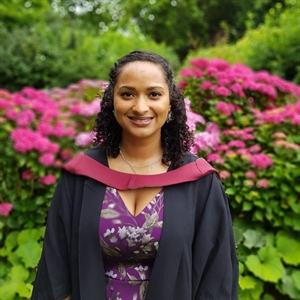 What year did you graduate?
What year did you graduate?
2015
What course did you study?
BSc(Hons) Biomedical Science
What is your current role?
Research Assistant at the Institute for Vector-borne Disease, Monash University, Melbourne, Australia (in collaboration with the World Mosquito Program).
How did you get into your current role?
In 2018, I completed an MRes in Cellular and Molecular Medicine at the University of Bristol, studying the molecular interactions between dengue virus and human proteins. This course was suggested to me by my BSc research project supervisor, Professor Steve Goodbourn, and I couldn't be more grateful. After completing the MRes, I continued to work in the virology department at the University of Bristol, gaining experience in various next-generation sequencing techniques and high-containment level procedures. As typical in academia, the funding ran out eventually and so I found my current job whilst looking for opportunities to work abroad. It just so happened that this role included next-generation sequencing, which I wanted more experience in, but applied to vector genomics. I thought I would be underqualified, but I got an interview and eventually an offer - just goes to show that you have to back yourself and go for it!
Can you describe a typical day?
I managed to perfectly time a move to the other side of the world with a global pandemic, so unfortunately I have spent a lot of time working from home rather than in the lab. However, it has given me the opportunity to intensively learn new computational biology techniques and lots about Aedes aegypti population genetics. I also run the lab's sequencing facility and provide assistance for experimental design and implementation.
What do you enjoy about your role?
I like the fact that I work with both academic- and industry-based teams. It can seem like a bit of a cliche, but everyday I am learning something new and challenging myself. I also like that working in academia means that I can work with people from all over the world.
What do you find challenging in your current role?
Not that it is necessarily a negative thing, but the constant moving of the goalposts. Trying to find answers to scientific questions always seems to lead to more questions, rather than solutions.
What advice would you give to a current student at St George’s who is keen to get into a similar area of work as you?
I would say, if you know what you want to do - go for it! If you're in your final year, speak to your research project advisor, or anyone whose work you're interested in, to see if you can study/work in their lab. I know when I was an undergraduate I was really scared of contacting researchers, but as long as you have a genuine interest in their work, most are happy to discuss potential projects with you. Twitter is another great place to find academics, many have accounts that document their lab's work and publications. I would also highly recommend an MRes rather than an MSc, as the extended time in the lab is where I learnt all that I know now. An MRes is also more favourable if you're planning on pursuing a PhD afterwards.
Which aspects of your degree are relevant for your current role?
All of the Cell and Molecular Biology units, the Infection & Immunity and Genes & Gene Expression final year modules. Also, everything that I learnt during my research project (innate immune responses to viral infection) - especially how to design my own experiments and keep accurate lab notes!
Do you have any advice or a message for current students at St George’s?
Really take advantage of all the mentors available, especially your personal tutors. Also, I felt that there was often a misconception that SGUL didn't have a lot of research labs, but there are so many research scientists working down the labyrinthine corridors of the Jenner Wing. There are also summer studentships available between 2nd and 3rd year that you can apply for, if interested.
Do you have any advice or a message for students considering studying at St George’s?
Go for it, the Biomedical Science course is great, and I felt the broad set of core subjects in the first two years really gave me a solid foundation of knowledge. I also really enjoyed living in Tooting.